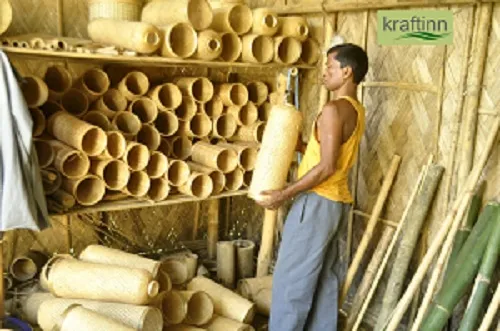Kraftinn: Crafting the Real Image of North-Eastern India?

Did you know that Assam is home to 34 different varieties of bamboo? Well, I’m no expert to quiz you about it, since I didn’t know about it either till I spoke to Parikshit Borkotoky. It was for good reason that he started Kraftinn. “I wanted to do something in a way North Eastern India is promoted. People have a different impression of the North East. We want to show that there’s so much more to know and see about the North Eastern part of India. Cane, bamboo, handlooms, Assamese jewelry – there are so many things that are not exposed to the rest of India or world market,” says Parikshit Borkotoky, Founder, Kraftinn.
Kraftinn, an eco-friendly company was started on June 14, 2010 at Jorhat, Assam with a small setup of 3 to 4 artisans selling bamboo products like lamps made out of 5-6 varieties of bamboo. They also remove the water hyacinths that block water flow in their rivers and recycle them to make bags and sell them. To choose the best bamboo for their products from their home-grown supply of bamboos, Kraftinn has a team of experts who select the right bamboo for harvest during the months of November and December. The harvested bamboos are then kept in shade away from the sun (to avoid cracking of the bamboos) to dry the water out and is later stalked to meet their production demands for a whole year.
After their initial break coming with designer Michael Knowles, Kraftinn has also exported its products to Japan and worked with companies like Himalaya Drugs, ONGC etc providing them with corporate gifting options. While they have two stores in Assam attached to their workshops, other stores like Ant Store, Indira Nagar and Came Boutique, Domlur in Bangalore and a few other stores in Delhi also sell their products. Kraftinn has supplied furniture and bamboo lights to a couple of resorts – Brahmaputra and Iora resorts in the Kaziranga National Park area.

Bamboo being a seasonal product, there was a need to make the business sustainable keeping the revenue flowing throughout the year. It was then Kraftinn decided to resort to online options with ecommerce sites like eBay, Shopo and Craftsvilla. “The online stores gave us business even during off-season when we had no bulk order and that made us wonder why not open ourown ecommerce store,” says Parikshit. Apart from online presence giving them continuous income, Parikshit is happy with the better inventory management that the ecommerce setup offers.

Expanding to the online space, they use social media, Google ads and newsletters to connect with most of the regular buyers and all other online channels to market their products. Facebook like many other startups is their main point of promotion. They also sell their products on their facebook page.
“With people willing to invest in natural and fancy green things, we are looking to provide green gifting options through our products to replace our competitor’s (currently being ‘HappilyUnmarried’ and ‘Chumbak.com’ ) options. We are into market based competition, not product based,” says Parikshit explaining their competition in the market.
Currently self-funded, they hope to expand investing in capital intensive Assamese jewellery, Muga silk and Eri silk which are exclusive to Assam. Kraftinn now has a team of 10 direct employeesincluding a few artisans and about 17 indirect employees (artisans) from whom they source a few products. By 2013, Kraftinn is looking to have 200 indirect employees and to meet this goal, they are working with different communities in Nagaland and Assam on designs by collaborating with the government.
Interesting that an offline business with the intent to promote North-Eastern India should go online and get more visibility and perennial business. Has ecommerce really solved the problem of perennial revenue flow? What are the other businesses that you think should go online for better business opportunity? More importantly, what do you think are the business that shouldn’t go online? Leave your comments below.
For more information on Kraftinn, check out their website.







